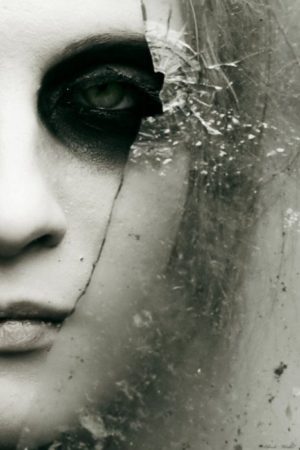You have no items in your cart. Want to get some nice things?
Go shopping
We’d usually get to my grandparents’ trailer around dusk. Outside, there was the taste of mountain air, a taste that makes my jaw ache with longing as I imagine it and try to describe it. The smell is earthy, like the hammered iron and shining sediment that form stairs in the area’s steep banks (magical, vertical paths on which locals nonchalantly ascend to and descend from their homes, reminding me of the angels in Jacob’s dream). The smell of the air is nourishing and full and bursting with flavor, like the taste that would greet us when we went inside: carrots and potatoes swimming in the broth of a venison roast. But mostly, it is refreshing and clean and necessary, like water.
And as with water, I am sometimes only aware of my thirst for it after I’ve begun to drink. On the nights we spent in the mountains, I would often open the door of the trailer for a few seconds at a time, even after Mom and Meme started making up the cot and pull-out sofa, a signal that we were winding down.
“You better watch out,” my brother Evans said one time, as I stuck my neck out for a gulp of that air. “Rawhead and Bloody Bones might get you.”
“Who is Rawhead and Bloody Bones?” I said. I was probably six or seven. These trips to my grandparents’ place were the closest thing to a vacation my family ever did. We lived in South Carolina’s Lowcountry; they lived in western North Carolina. The states seemed like different worlds to me then. They were the two worlds I knew.
“A monster that lives in a cave up the road,” Evans said. “He looks in the windows of houses at night, and if he sees a kid who’s not asleep, he reaches in and grabs them.”
“Oh,” I said. That night, I prayed for God to protect all local children from Rawhead and Bloody Bones, on the off-chance that the creature was real. Later on that same trip, Evans pointed out Rawhead’s cave to me, a sad-looking mine on the side of the road with a black garbage bag for a door. It was the perfect spot for Bloody Bones! He lived on the Pennywinkle, a labyrinth of a road with sharp hairpin turns. That street stayed dark from a tangle of trees and moss and created for me the layered mood of a good horror story: romantic, mysterious, frightening in a delicious way.
The garbage bag was the right touch, for it captured the contrast of the area’s natural beauty with the squalor of many local homes, and the sadness of some who inhabited them. There was Mom’s uncle, Jay, who lived about a tenth of a mile from Meme and Bobby, with his mother in her home. There were two places he might be: in his back bedroom, behind a door of warped, cheap wood that smelled like cigars and stayed locked, or in a scratchy chair in front of the scratchy TV, drinking can after can of light beer and ignoring his guests.
By day, he shared that room with his mother, Mama Pansy. She didn’t talk very much by the time I was old enough to know her. I can only remember her clutching her handkerchief and staring very hard at my mom, either trying to place her or figure out how she’d pretend she could. Mom would talk to Mama Pansy louder and louder, and Jay kept turning up the television volume.
Then was there was Mom’s Uncle Donny, who lived in the red house across the street from Jay and Mama Pansy. This is a house that’s still standing; I can see it through the trees from my grandparents’ yard. The house was pretty on the outside, dim, dirty, and bare on the inside, except for some dusty stuffed animals that lined a window in a back room. Donny smoked cigarettes and drank dark liquor from the handle in front of his own scratchy TV. He was missing a leg, like his dog. Like Jay, he seemed to have no interest in leaving his post, though he had a wife and children and grandchildren who all lived with him on and off. Unlike Jay, he seemed happy to see my mom on her visits, or at least happy to oblige her. Mom’s told me a few times about the night Donny came home from Vietnam. The whole family went to see him. They stood around in the yard of Mama Pansy’s house; he played Bob Dylan from his truck.
There was also Mom’s Uncle Harry, who I remember seeing only once, as a child back in the days before Meme and Bobby had built the trailer and moved back to North Carolina to take care of Mama Pansy. He was hoeing the yard, and he raised his gloved hand in a wave and smiled without parting his lips. In that liminal time, after I was born but before Meme and Bobby had a place again, I stayed in Uncle Harry’s room a few times, I think after he died. That itself was like staying in a cave. To reach it, you crawled through the dark tunnel of the living room, then Mama Pansy’s room, and then you were in a windowless pit that had nothing beyond it, except Uncle Jay’s room, which was forbidden, like Bluebeard’s quarters. Even as a child, I knew that if I could peek behind the door, I would find guns, not the heads of gorgeous women, and filth, not treasure. But these things held their own terror and curiosity; I felt I was in a world of dark fairy tales.
I would ask Meme to tell me stories to put me to sleep. Having never found a use for fiction or even reading, she was bad at this. She told me about being cold and hungry as a child, but didn’t know to add an element of magic or humor, or any twist at all, any beginning or any end. Once, she described a beautiful, colorful dress she’d had.
Now we’re getting somewhere, I thought, impressed by her lavish description and the lilt of hope in her voice. This story did have a twist: on the first time it was worn, the tail was caught beneath the wheels of a train and was ruined. That was that, as times were lean and the dress couldn’t be replaced. When I realized this was the conclusion, I wailed with shock and disappointment.
“Oh!” Meme said, and jumped back, startled, as if she’d had no idea that the story was a downer. “Deborah!” she called, and my mom came in to comfort me. Later, I’d learn there was a little more to the narrative. Mama Pansy saw Meme playing on the track just a moment before she disappeared behind a train. Mama Pansy had to wait until the train had passed to see if her daughter was killed or not – minutes that must have seemed like eons, minutes that must have changed her, but came with relief at the end. A proper story.
My grandparents had little in common, but I suppose they had that: an unwillingness to dress up a true story or even tell the good parts of it, and a scornful disinterest in tales that weren’t real.
“What does Rawhead and Bloody Bones look like?” I asked Evans on one of our later visits. Evans started to say something about a pile of bones assembling themselves under a skinless, dripping skull, whatever he’d heard or imagined about this local legend whose roots were in English and Scots-Irish folklore, but Bobby interrupted him.
“I’ll show you what Rawhead and Bloody Bones looks like,” he said. Bobby spoke slow and haltingly. Each word took him about a full second to say, and the space between each word was just as long. He stood up from the sofa and walked over to his little bookshelf. He was wearing a blue shirt and tan pants, like always. He wagged his finger over his set of encyclopedias and I waited with bated breath for him to pull out the one labeled “R.” Instead, he pulled out the one labeled “S,” and turned very slowly to a picture of a skeleton. “This here,” he said, “is Rawhead and Bloody Bones.” We smiled at each other.
It was quite the picture: all the organs bright red and orange, bones the color of light, lots of tiny labels where the ink was black-purple like a raven. The picture combined the technical precision and artistry of a blueprint. On top of it, there was a thick sheet of film that gave more detail, but also fodder for the imagination. It made me think of all the objects that offer a more intense look at reality as well as an escape from it: cameras, kaleidoscopes, the stereoscope of the Victorian age. Books were no different, especially books that chose to gratuitously offer something even beyond the great gift of words and pictures, books that had pockets with ribbon, like the pop-up tome Meme got me at a yard sale, or books like this one, with its sheet of film and pages thinner than the slightest sugar glaze: books that had, marvelously, texture and dimension as well as ideas, a feast for the hands as well as the mind. Looking at that skeleton, I felt a thousand little worlds had opened for me.
I like to imagine what Bobby was trying to say with that picture. Maybe he was trying to show me that science holds as much interest as fantasy. Maybe he was trying to save me from nightmares. Probably he was trying, gently and with humor, to quell my indulgence in made-up horrors, when life offered such a bounty.
When he was a child, his brother walked out of the schoolhouse to get a drink of water from the barrel on the porch. Two teenagers drove by while he drank, and one dared the other to shoot the gourd out of his hand. The boy took the dare, and killed my great-uncle. The children ran out of the schoolhouse screaming, toward home, only Bobby and his siblings left to hold their dying brother’s head. The boy who shot him was related to us somehow, as everyone around there seems to be.
As a kid, I hadn’t heard that story yet, and I didn’t ask for Bobby to clarify why he had taken the encyclopedia down. I had one last theory as to why he had done it, and though I knew it was unlikely, I wanted to keep the possibility of it in my mind. Maybe he was playing along, indulging me as other grandfathers would do. Maybe he was saying, “This is the monster that has captured your fantasies. Now you know what he looks like.”

Caroline McTeer
Caroline McTeer lives in San Diego with her husband and cats. She's been published at sojo.net, in edible Upcountry, and TOWN Magazine.
- Web |
- More Posts(1)




